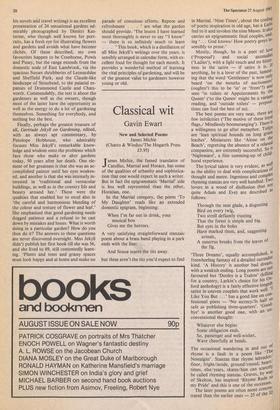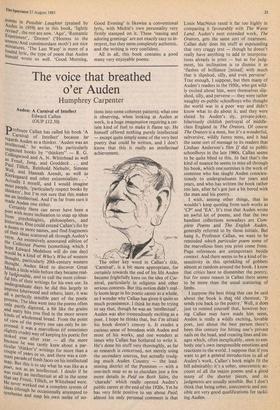Classical wit
Gavin Ewart
New and Selected Poems James Michie (Chatto & Windus/The Hogarth Press £3.95)
James Michie, the famed translator of Catullus, Martial and Horace, has some of the qualities of urbanity and sophistica- tion that one would expect in such a writer. But in fact the epigrammatic 'Martial' side is less well represented than the other, Horatian, one.
In the Martial category, the poem `To My Daughter' reads like an extended domestic epigram, beginning: When I'm far out in drink, your musical box Gives me the horrors.
A very satisfying straightforward stanzaic poem about a brass band playing in a park ends with the line: And Sousa scares the tits away.
but these aren't the tits you'd expect to find
in Martial. 'Nine Times', about the cooling of poetic inspiration in old age, has a Latin feel to it and invokes the nine Muses. It also carries an epigrammatic final couplet, end- ing ... God knows/ How poetry greys in- sensibly to prose.'
Mostly, though, he is a poet of love
(' Proposal') and social anomalies ('Ladies'), with a light touch and no bitter- ness in the satire — if satire it is. If anything, he is a lover of the past, lament" ing that the word 'Gentlemen' is now only heard 'on the mouths of auctioneers (oughtn't this to be 'in' or 'from'?) and seen 'in toilets or Appointments by the Queen' ('to the Queen' might be a variant reading, and 'outside toilets' — preposi- tions can fool the best of us). The best poems are very neat, there are few infelicities (`The motive of these loyal flags,/ Mindlessly boomeranging'). There Is a willingness to go after metaphor. Tulips are 'lean spiritual hounds on long green leashes'. Miniatures like 'Alone on tile, Beach', regretting the absence of a relaxed companion, are extremely successful. So Is 'Nightmare', a fine summing-up of child- hood experience. The lyrical talent is very evident, as well as the ability to deal with complications of thought and metre. Ingenious and complex rhyming stanzas are very well handled. Two lovers in a wood of disillusion (but not quite Adam and Eve) are described as follows:
Through the neat glade, a disgusting Bird on every twig, Two stroll defiantly trusting That the forest is simple and big. But eyes in the boles Have marked them, and, suggesting urinals, A susurrus breaks from the leaves of the fig.
'Three Dreams', equally accomplished, .ts freewheeling fantasy of a detailed surrealist kind. 'A History' is another bad dream with a weakish ending. Long poems are not favoured but 'Dooley is a Traitor' (killing for a country, Larkin's choice for his Ox' ford anthology) is a fairly effective Wall satire in uneven couplets that work well. Like You But ...' has a good line on con- fessional poets — `No secrecy/Is half so safe as publishing three-quarters'. '600d- bye' is another good one, with an un- conventional thought:
Whatever else begins Some obligation ends.
So, passenger and well-wisher, Wave cheerfully at bends.
The occasional wandering in and out of rhyme is a fault in a poem like 'Tile Nostalgist'. Stanzas that rhyme labrador/ floor, fright/inside, ground/round,
heart/
times, else/years, skates/him can scarcely be called rhyming stanzas. Graves, by way of Skelton, has inspired 'Rhyme Rude to my Pride' and this is one of the successes. The later poems are often more concen- trated than the earlier ones — 25 of the 32 Poems in Possible Laughter (praised by Auden in 1959) are in this book, 'lightly revised', the rest are new. 'Ago', 'Romantic Experiment', 'Doreen' ('Hostess to the unseen/And cunnimordant moth') are nice miniatures. 'The Last Wasp' is more of a loaded lyric, the type of poem that Auden himself wrote so well. 'Good Morning,
Good Evening' is likewise a conventional lyric, with Michie's own personality very firmly stamped on it. These 'teasing and adoring greetings' are not exactly easy to in- terpret, but they seem completely authentic, and the writing is very confident.
All in all, this book contains a good many very enjoyable poems.



































 Previous page
Previous page